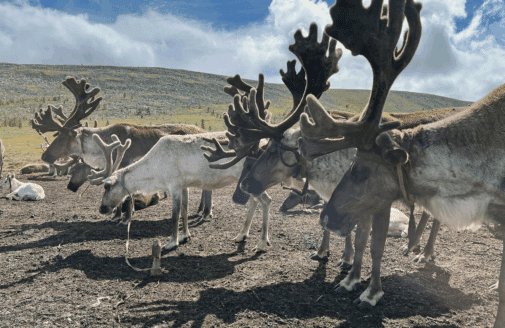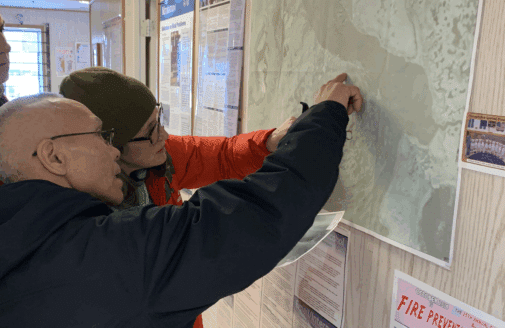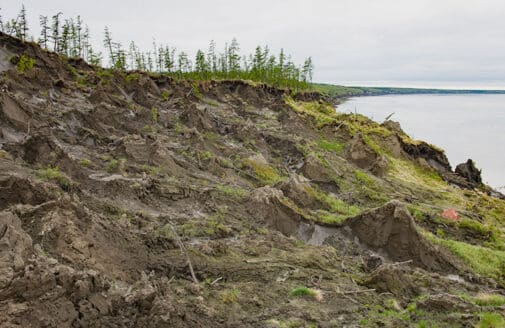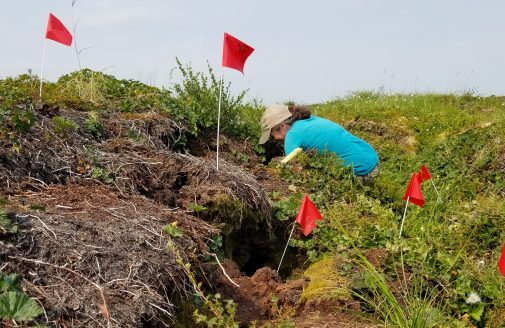Woodwell Climate to lead critical Arctic climate research thanks to new Gordon and Betty Moore Foundation funding
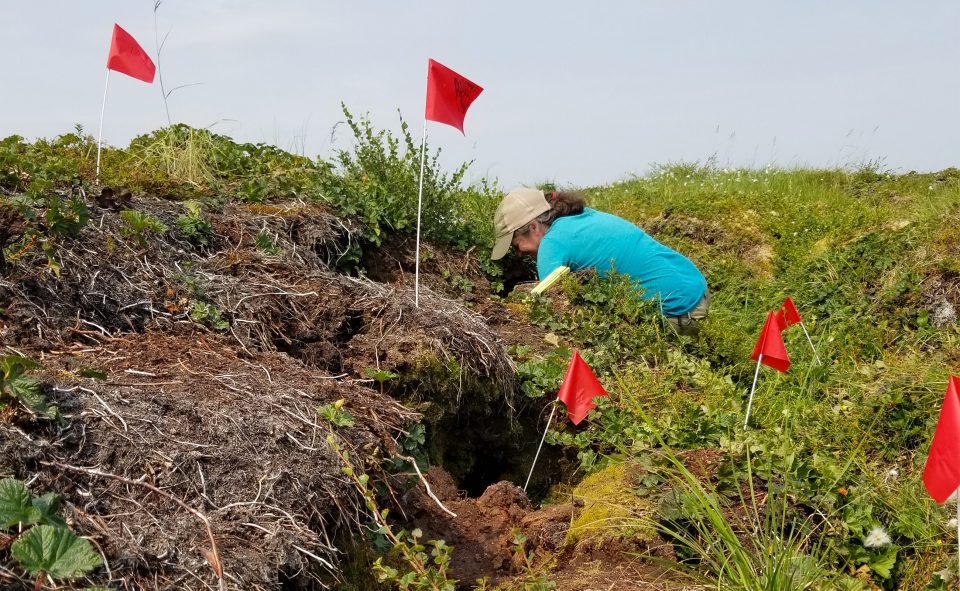
Dr. Sue Natali examines thawed permafrost “slumps” in Alaska’s Yukon River Delta.
Photo courtesy of Aqua Sanders
Aiming to provide crucial new research to inform the upcoming international climate negotiations, Woodwell Climate Research Center (formerly Woods Hole Research Center) scientists are embarking on a multifaceted campaign to gain new understanding on how quickly permafrost regions are changing and what that means for global warming.
With initial funding from a new $2.4 million grant from the Gordon and Betty Moore Foundation, Woodwell Climate and partners at the Harvard Kennedy School’s Belfer Center for Science and International Affairs are launching the Arctic Carbon Monitoring and Prediction System. Woodwell Climate will lead the scientific aspects of the work, with the Arctic Initiative at the Belfer Center overseeing the policy components.
Across the polar regions, from Alaska to Siberia, permafrost holds much more carbon than has ever been released by humans, with potentially disastrous consequences for the climate system. But thawing permafrost carbon had not yet been included in the models and reports that inform international climate policy by the United Nations Framework Convention on Climate Change (UNFCCC). Alaska recorded its hottest month ever in July, and so far in 2019, Alaska has had over 650 wildfires burn about 2.5 million acres, two and a half times the historic average of average.
“The science on permafrost carbon was not incorporated into the climate formulas which underpinned the Paris Agreement, which means the limits on all other carbon sources established in that Agreement are gravely inadequate. As we look ahead to the next generation of global climate progress, there’s an urgent need to collect the best data on Arctic carbon emissions and turn that into sound policy,” said Dr. Sue Natali, Woodwell Associate Scientist, Arctic Program Director, and Director of The Polaris Project.
Woodwell Climate Research Center’s Arctic Carbon Monitoring and Prediction System will include:
- Field research to understand the processes driving emissions from permafrost thaw and wildfire, as well as monitoring of key variables in under-sampled regions to allow scaling of observations across the Arctic.
- Remote sensing to scale up field-based observations to the full Arctic region. It will deliver near-real-time estimates of wildfire-burned areas across the Arctic, measuring plots down to the size of a baseball diamond, as well as estimating burn depth and carbon emissions.
- Modeling to evaluate the implications of Arctic permafrost emissions for global climate policy.
- Development of a high-powered and interactive web visualization platform to communicate Arctic change to the public, policymakers and Arctic residents.
The Arctic Initiative at Harvard Kennedy School’s Belfer Center will include:
- Convening policymakers and scientists, at venues such as the Arctic Research Forum and Harvard University, to understand ongoing efforts, gaps and opportunities regarding permafrost thaw on the global climate.
- Communicating findings to policymakers and opinion leaders in key nations and the Arctic Council.
- A link to Harvard teaching and fellowship programs to help train a new generation of Arctic policy leaders.
A key goal of the project is to ensure Arctic permafrost and wildfire carbon emissions are taken into account in the 2023 “global stock take” called for in the 2015 Paris Agreement.
“More extensive on-the-ground measurements and better modeling are critical for understanding exactly how much carbon dioxide and methane will be released from thawing permafrost, in order to account for those emissions in global planning and targets,” said Dr. John Holdren, Woodwell Senior Adviser to the President and Professor at the Harvard Kennedy School, Department of Earth and Planetary Science, and School of Engineering and Applied Science. As President Obama’s Chief Science and Technology Advisor, Dr. Holdren played a key role in developing the administration’s climate policy.
Woodwell Climate Research Center will continue to seek sponsoring partners for the Arctic Carbon campaign to help deliver the funding necessary to support this critical climate research.
***
About Woodwell Climate Research Center:
Woodwell Climate Research Center has been studying climate change and developing solutions since 1985. Woodwell Climate works with an international network of partners in the private and public sectors to ensure that science is put to use in climate policy and decision-making. Recent major science and policy projects have taken place in Alaska, Brazil, Mexico, Nepal, the Democratic Republic of the Congo, and others, with collaborators such as the World Bank, NASA, USAID and The Nature Conservancy. Woodwell Climate has earned Charity Navigator’s highest rating of 4 stars, as well as a Gold Seal of Transparency from GuideStar. Follow Woodwell Climate on Facebook, Twitter and Instagram or subscribe to our monthly newsletter.
About the Belfer Center for Science and International Affairs:
The Belfer Center is the hub of Harvard Kennedy School’s research, teaching, and training in international security and diplomacy, environmental and resource issues, and science and technology policy. The heart of the Belfer Center community is its resident research community of more than 200 scholars, including Harvard faculty, researchers, practitioners, and each year a new, international group of research fellows. Through publications and policy discussions, workshops, seminars, and conferences, the Center promotes innovative solutions to significant national and international challenges. A vital component of its practices is its integration of the insights and research of social scientists, natural scientists, technologists, and practitioners in government, diplomacy, the military, and business.
About the Gordon and Betty Moore Foundation:
The Gordon and Betty Moore Foundation fosters path-breaking scientific discovery, environmental conservation, patient care improvements and preservation of the special character of the Bay Area. Visit Moore.org and follow @MooreFound.




